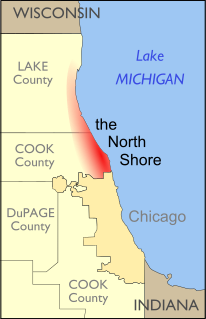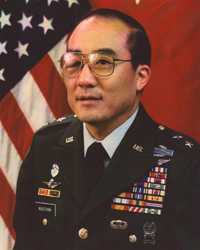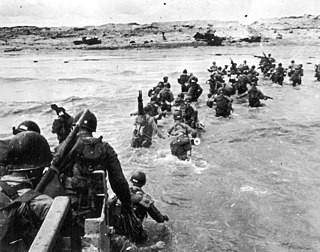
John Alexander Logan was an American soldier and political leader. He served in the Mexican–American War and was a general in the Union Army in the American Civil War. He served the state of Illinois as a State Senator, a Congressman, and a U.S. Senator and was an unsuccessful candidate for Vice President of the United States with James G. Blaine in the election of 1884. As the 3rd Commander-in-Chief of the Grand Army of the Republic, he is regarded as the most important figure in the movement to recognize Memorial Day as an official holiday.

Dachau concentration camp was the first of the Nazi concentration camps opened in 1933, intended to hold political prisoners. It is located on the grounds of an abandoned munitions factory northeast of the medieval town of Dachau, about 16 km (10 mi) northwest of Munich in the state of Bavaria, in southern Germany. Opened by Heinrich Himmler, its purpose was enlarged to include forced labor, and eventually, the imprisonment of Jews, German and Austrian criminals, and eventually foreign nationals from countries that Germany occupied or invaded. The Dachau camp system grew to include nearly 100 sub-camps, which were mostly work camps or Arbeitskommandos, and were located throughout southern Germany and Austria. The camps were liberated by U.S. forces on 29 April 1945.

Nazi Germany maintained concentration camps throughout the territories it controlled before and during the Second World War. The first Nazi camps were erected in Germany in March 1933 immediately after Hitler became Chancellor and his Nazi Party was given control of the police by Reich Interior Minister Wilhelm Frick and Prussian Acting Interior Minister Hermann Göring. Used to hold and torture political opponents and union organizers, the camps initially held around 45,000 prisoners. In 1933–1939, before the onset of war, most prisoners consisted of German Communists, Socialists, Social Democrats, Roma, Jehovah's Witnesses, homosexuals, and persons accused of 'asocial' or socially 'deviant' behavior by the Germans.

The North Shore consists of many affluent suburbs north of Chicago, Illinois, bordering the shores of Lake Michigan. These communities fall within suburban Cook County and Lake County. The North Shore's membership is often a topic of debate, and is sometimes expanded to include other affluent Chicago suburbs which do not border Lake Michigan. However, Evanston, Wilmette, Kenilworth, Winnetka, Glencoe, Highland Park, Lake Forest, and Lake Bluff are generally considered to be the main members of the North Shore, as all are affluent communities that border the lake just north of Chicago. Other suburbs such as Glenview, Northbrook, Deerfield, and Northfield are often considered to be a part of the North Shore, but do not border Lake Michigan. Northwestern University is also located in the Evanston area of North Shore Chicago.

Holocaust victims were people who were targeted by the government of Nazi Germany for various discriminatory practices due to their ethnicity, religion, political beliefs, or sexual orientation. These institutionalized practices came to be called The Holocaust, and they began with legalized social discrimination against specific groups, and involuntary hospitalization, euthanasia, and forced sterilization of those considered physically or mentally unfit for society. These practices escalated during World War II to include non-judicial incarceration, confiscation of property, forced labor, sexual slavery, medical experimentation, and death through overwork, undernourishment, and execution through a variety of methods, with the genocide of different groups as the primary goal.

The Pritzker Military Museum & Library is a museum and a research library for the study of military history in Chicago, Illinois, US. It was founded in 2003 to be a non-partisan institution for the study of "the citizen soldier as an essential element for the preservation of democracy" by Colonel Jennifer Pritzker, who had just retired from the Illinois Army National Guard. Originally located in the Streeterville neighborhood at 610 N. Fairbanks Court, the library later moved to 104 S. Michigan Avenue in the Loop. The Museum & Library is supported by donations and membership.

The 20th Indiana Volunteer Infantry Regiment was an infantry regiment that served in the Union Army during the American Civil War. The Regiment was officially raised on July 22, 1861, by William L. Brown, the first Colonel of the Regiment, in response to President Lincoln's call for volunteers. At the time of muster, the regiment had 9 fighting companies lettered A-K along with a staff company for a total of 10 companies, roughly 1000 men. The 20th Indiana saw engagements in most of the major battles of the American Civil War, including the action between the first ironclads at Hampton Roads, the Battle of Fredericksburg, the Battle of Gettysburg, and the Siege of Petersburg. The Regiment was part of the 1st Brigade, 3rd Division, III Corps for the duration of the war.
Alex Kershaw is an author of books on World War II, including The New York Times best-sellers The Bedford Boys and The Longest Winter.
Nazi human experimentation was a series of medical experiments on large numbers of prisoners, including children, by Nazi Germany in its concentration camps in the early to mid 1940s, during World War II and the Holocaust. Chief target populations included Romani, Sinti, ethnic Poles, Soviet POWs, disabled Germans, and Jews from across Europe.

The Illinois Holocaust Museum and Education Center is a museum located in Skokie, Illinois near Chicago.

Jay Robert Pritzker, known as J. B. Pritzker, is an American businessman, philanthropist and politician serving as the 43rd Governor of Illinois since 2019. He is a private business owner based in Chicago and a managing partner and co-founder of the Pritzker Group and a member of the Pritzker family who own the Hyatt hotel chain; he has an estimated personal net worth of $3.5 billion.

Death marches refers to the forcible movements of prisoners of Nazi Germany between Nazi camps during World War II. They occurred at various points during the Holocaust, including 1939 in the Lublin province of Poland, in 1942 in Reichskommissariat Ukraine and across the General Government, and between Autumn 1944 and late April 1945 near the Soviet front, from the Nazi concentration camps and prisoner of war camps situated in the new Reichsgaue, to camps inside Germany proper, away from reach of the Allied forces. The purpose was to remove evidence of crimes against humanity committed inside the camps and to prevent the liberation of German-held prisoners of war.

Henry Joseph Reilly was an American soldier and journalist. After World War I, Reilly helped found the Reserve Officers Association.

Jennifer Natalya Pritzker is an American investor, philanthropist, and member of the Pritzker family. Pritzker retired as a Lieutenant Colonel from the United States Army in 2001, and was later made an honorary Colonel in the Illinois Army National Guard. Founder of the Tawani Foundation in 1995, Tawani Enterprises in 1996, and the Pritzker Military Library in 2003, Pritzker has been devoted to civic applications of inherited and accrued wealth, including significant donations to broaden understanding and support for "citizen soldiers."
At the end of the 20th century there were a total of 270,000 Jews in the Chicago area, with 30% in the city limits. In 1995 there were 154,000 Jews in the suburbs of Chicago. Of them, over 80% of the Jews in the suburbs of Chicago live in the northern and northwestern suburbs. In 1995, the largest Jewish community in the City of Chicago was in West Rogers Park. By 1995 the Jewish population within the City of Chicago had been declining, and it tended to be older and more well educated than the Chicago average. Jews in Chicago came from many national origins including those in Europe and Middle East, with Eastern Europe and Germany being the most common.

James Mukoyama was the youngest American to command a United States Army division. He served over thirty years on active and reserve duty in the Army, including service in Korea and Vietnam.
Pritzker Military Presents is an original programming series produced by the Pritzker Military Museum & Library. It airs on PBS channels WYCC, WTTW Channel 11, and WTTW-Prime Channel 11-2 weekly. There are currently over 400 episodes. Weekly topics cover various parts of military history.
Tadeusz Debski (1921–2011) was a Polish survivor of the Nazi concentration camps, and the oldest person to receive a doctorate at the University of Illinois at Chicago. His thesis, "The Battlefield of Ideas: Nazi Concentration Camps and Their Polish Prisoners," was published in 2001 by East European Monographs and distributed by Columbia University Press. ISBN 0880334789

Robin Paul Whittick "Rob" Havers is a British military historian. He served as president of the George C. Marshall Foundation and as a former Senior Lecturer in War Studies at the Royal Military Academy Sandhurst.






















